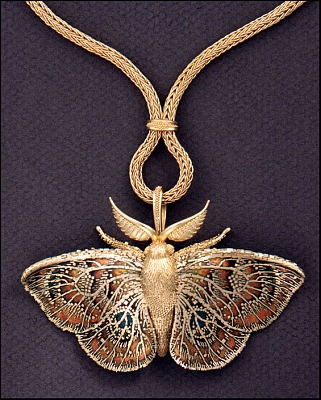John Paul Miller 4-23-1918 to 3-1-2013
A belated but no less heartfelt obit for one of the heroes of modern goldsmithing. Followed by the reasons why I think luminaries like him – in any field – are incredibly important to artists just learning their craft.
When I was a total neophyte fussing around with the tiniest imaginable butane torch and some copper wire, a few of the library’s better how-to-make-jewelry books featured this mysterious American wizard named John Paul Miller. Even decades ago (within his first twenty years of making jewelry, in fact) he was being compared to René Lalique and Louis Comfort Tiffany.

Like Tiffany, Miller did things with gold and enamel that I could not comprehend. He was one of the first few modern goldsmiths to recreate the lost, ancient art of gold granulation, by which thousands of tiny gold spheres were fused to a gold backing to create a shimmering, lightly textured effect.
He took granulation into wild, weird places. He had a naturalist’s eye for detail, and a storyteller’s grasp of mythic effect. He had an iconic style that evolved over the decades, but never followed the overt trends of each era. Nor was he a diva, choosing to live quietly in Ohio and teach multiple generations of aspiring goldsmiths.
I never met him. I wish I had, but seeing his work is enough distant worship for me.
So, why is this man’s life and work so important? Not just to jewelers, but to any creative person?
It’s a kick in the ass, in a good way. Especially if we know just enough about stellar jewelry, painting, writing, or custom car-building (insert craft of your choice) to grasp how amazing these examples are.
It’s only human, when faced with something so gorgeous, so technically perfect, so out of our league, to curl in upon ourselves in a momentary tide of depression and fear of failure. We think we can never measure up. These folks have decades on us, better funding, better schooling, better marketing. They are Names. We’re nobodies.
It’s self-indulgent to stay that way, and use such examples as an excuse not to try harder, or to do ‘just enough’. In writing, I often see similar reactions from many vanity-published and self-published authors, who either innocently don’t know how inexpert they are, or have willfully deluded themselves otherwise. A key refrain there, upon seeing a great debut writer snapped up in a six-figure advance contract with a major commercial publisher, is a disdainful sniff and a mutter about bribery and nepotism. Sometimes. More often that success was luck (opportunity) bolstered by dedication to craft.
I also see it from certain genre authors who have established a comfortable, lowest-common-denominator niche and never stir out of it, secure that their fans will never ask more of them. They don’t want a RITA, a Nebula, or a Pulitzer award. They’re happy getting paid for writing the literary equivalent of crack cocaine and masturbation. And believe me, they will get paid.
But it’s character-building to swallow the hurt. To accept the joy of seeing someone else’s wonderful achievement. Of knowing ‘Somebody built that. Maybe I can come close.’ And then to go try, even if we may not reach those Olympian heights.
If we don’t try, we won’t know how far we can really go.